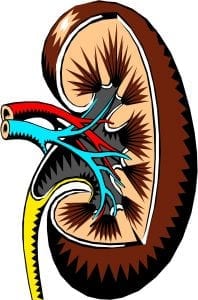Hepatorenal Syndrome (HRS)
What is hepatorenal syndrome?
Hepatorenal syndrome (HRS) is a form of kidney failure that often comes with severe damage to the liver. There are two forms of this condition: 1 and 2. The first is associated with rapid kidney failure, while the latter is associated with more gradual kidney damage. Unfortunately, this syndrome is almost always fatal.
What are the symptoms of hepatorenal syndrome?
Symptoms include:
- Delirium
- Nausea
- Confusion
- Weight gain
- Dementia
- Vomiting
- Jaundice
- Discolored urine
- Swollen abdomen
- Urinating less frequently
What causes hepatorenal syndrome?
This syndrome is a complication of liver disease. Cirrhosis of the liver can lead to HRS. While not all cases of liver disease progress to HRS, there are risk factors that can increase the likelihood. These include using diuretics, gastrointestinal bleeding, unstable blood pressure, infections, spontaneous bacterial peritonitis, and acute alcoholic hepatitis.
How is hepatorenal syndrome diagnosed?
The first step in diagnosing this condition is a physical exam, where doctors will look for sores on the skin, swollen breast tissue, jaundice, and a buildup of fluid in the abdomen. Further tests will be needed, such as blood and urine tests.
What are the treatments for hepatorenal syndrome?
It is important to treat this condition as a medical emergency. Doctors will use dialysis and vasoconstrictors for treatment, but the best option is a liver transplant.
Where can I find out more about hepatorenal syndrome?
HRS Articles


OCE-205 for Hepatorenal Syndrome Earns Orphan Drug Designation







